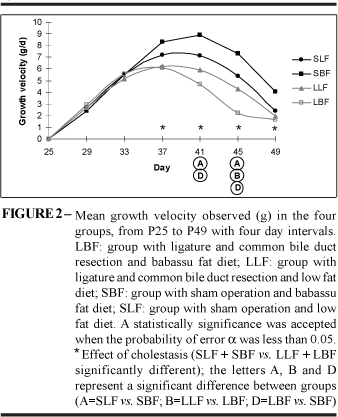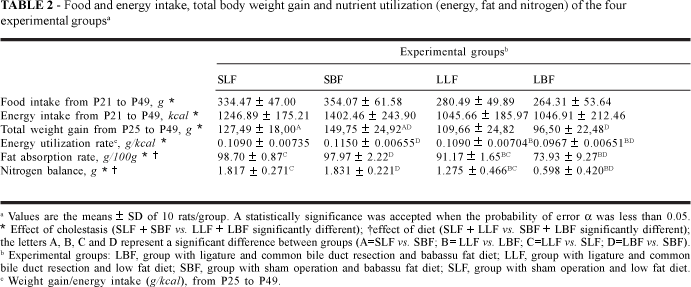PURPOSE: To test the effects of a low fat diet compared with a babassu fat diet on nutritional status in obstructive cholestasis in young rats. METHODS: We submitted 40 rats in 4 groups of 10 animals each from P21 (21st postnatal day) to P49 to two of the following treatments: bile duct ligation or sham operation and low fat diet (corn oil supplying 4.5% of the total amount of energy) or babassu fat diet (this fat supplying 32.7% and corn oil supplying 1.7% of the total amount of energy). Weight gain from P25 to P49 every 4 days was measured. The Verhulst's growth function was fitted to these values of weight gain. Growth velocity and acceleration at each moment were estimated using the same equation. Total food and energy intake from P21 to P49, energy utilization rate (EUR) from P25 to P49 and fat absorption rate (FAR) and nitrogen balance (NB) from P42 to P49 were measured. Two Way ANOVA and the S.N.K. test for multiple paired comparisons were employed to study the effects of cholestasis and those of the diets and their interaction (p<0.05) on those variables. RESULTS: In cholestatic animals, a higher growth velocity at P45, a higher growth acceleration at P41 and P45, a greater EUR, a greater FAR and a greater NB, were found with the low fat diet as compared with the babassu fat diet. CONCLUSION: A low fat diet lessens the growth restriction brought about by cholestasis and allows for an improved dietary energy utilization and a better protein balance than the babassu fat diet.
Cholestasis; Vegetable Fats; Triglycerides; Rats






